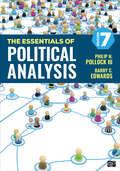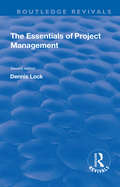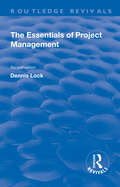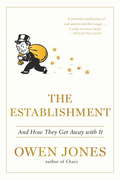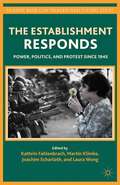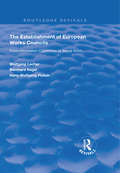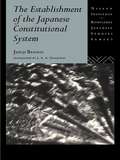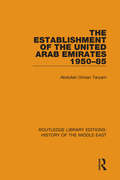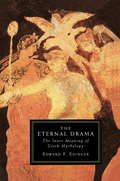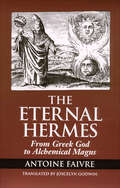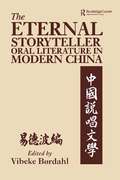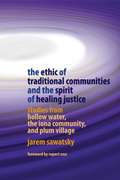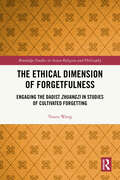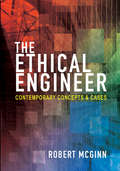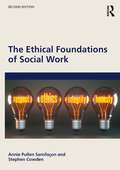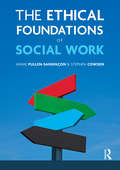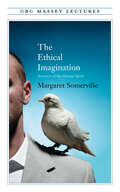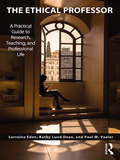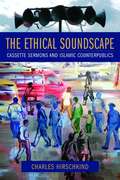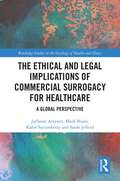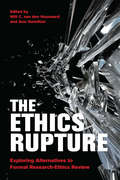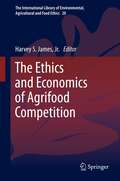- Table View
- List View
The Essentials of Political Analysis
by Philip H. Pollock Barry Clayton EdwardsEquip students with the skills and confidence they need to conduct political analyses and critically assess statistical research. In the Seventh Edition of The Essentials of Political Science, bestselling authors Philip H. Pollock III and Barry C. Edwards build students’ analytic abilities and develop their statistical reasoning with new data, fresh exercises, and clear examples. This brief and reader-friendly guide walks students through the essentials— defining measurement, formulating and testing hypotheses, measuring variables—while using key terms, chapter-opening objectives, over 80 tables and figures, and practical exercises to get them using and applying their new skills. Using Excel, R, SPSS, or STATA? Companion workbooks featuring statistical software instructions and exercises help your students apply their knowledge.
The Essentials of Project Management
by Dennis LockThis title was first published in 2001. Synopsis: The Essentials of Project Management is a primer assembled from Dennis Lock's comprehensive book, Project Management. It provides a concise, straightforward account of the principles and techniques of project management designed to meet the needs of the non-specialist. This second edition reflects the changes made for the seventh edition of Project Management. The ideal introduction for anyone responsible for managing projects, as well as students.
The Essentials of Project Management (Routledge Revivals)
by Dennis LockThis title was first published in 2001. A primer distilled from the author's Project Management. It provides a straightforward account of the principles and techniques of project management, designed to meet the needs of the non-specialist. Using examples and illustrations, the author introduces key project management procedures.
The Establishment
by Owen JonesA major bestseller in the UK and a six-time Best Book of 2014, The Establishment is a sweeping look at how power and money have made British politics hugely undemocratic. Power, money, and undemocratic politics--wait, does that sound familiar?Who wields power in politics? It is a question that's asked all too often--and never really answered. But that's exactly what Owen Jones has done in The Establishment, which has already taken Great Britain by storm. To expose the shadowy and unaccountable network of people who dominate British political life--the people who influence major decisions and reap huge profits in the process--Owen Jones sets out on a journey into the very heart of the elite.From the lobbies of the Houses of Parliament to Rupert Murdoch's newsrooms to the conference rooms of some of the world's biggest banks, Jones systematically explores the revolving doors that link the worlds of politics, media, and finance--and shows how this corrupt and incestuous world came to be.Funny, sharp, and rich with brilliant descriptions of the men and women at the heart of the elite, The Establishment is a joy to read, but its diagnosis is deadly serious: the establishment is the biggest threat to democracy today. And it's time, writes Jones, for it to be challenged.From the Hardcover edition.
The Establishment Responds
by Martin Klimke Joachim Scharloth Kathrin Fahlenbrach Laura WongThis volume fills this gap by examining the many ways in which political parties, the business world, foreign policymakers, and the intelligence community experienced, confronted, and even actively contributed to domestic and transnational forms of dissent.
The Establishment of European Works Councils: From Information Committee to Social Actor (Routledge Revivals)
by Hans-Wolfgang Platzer Wolfgang Lecher Bernhard NagelFirst published in 1999, this volume evaluates the context, role and development of EWCs through eight case studies and asks whether EWCs will promote the Europeanisation of Industrial relations. The EWCs were the first European institution in the field of social policy and went far beyond simply requiring national implementation of a common framework. They were innovative in their requirements for a judicious blend of subsidiarity, shared responsibility and flexibility. This study represents the culmination of research carried out between September 1996 and September 1997 and sets out to anchor a number of qualitative case-studies in a systematic, nationally comparative approach.
The Establishment of the Japanese Constitutional System (Nissan Institute/Routledge Japanese Studies)
by Junji BannoThe 1889 Meiji constitution: how it actually worked, the establishment of the Diet and the shifting roles and interests of the parties. A Japanese classic translated by one our leading authorities.
The Establishment of the United Arab Emirates 1950-85 (Routledge Library Editions: History Of The Middle East Ser.)
by Abdullah Omran TaryamThe United Arab Emirates were established in response to the British decision to withdraw from the Gulf by 1971. This decision, announced in 1968, had left the rulers of the emirates perplexed and alarmed. After decades of mutual suspicion and rivalry, fostered by British imperial dominance, the emirates were now obliged to seek security in fede
The Eternal Criminal Record
by James B. JacobsFor 60 million Americans a criminal record overshadows everything else about their identity. Citizens have a right to know when someone around them represents a threat. But convicted persons have rights too. James Jacobs examines the problem of erroneous records and proposes ways to eliminate discrimination for those who have been rehabilitated.
The Eternal Drama: The Inner Meaning of Greek Mythology
by Edward EdingerZeus, Aphrodite, Apollo, Artemis, Athena--do the gods and goddesses of Greece have anything to say to us that we haven't already heard? In this book, based on a series of his lectures, the eminent Jungian analyst and writer Edward F. Edinger revisits all the major figures, myths, oracles, and legends of the ancient Greek religion to discover what they can still reveal--representing, as they do, one of the religious and mythic foundations of Western culture. Building on C. G. Jung's assertion that mythology is an expression of the deepest layers of mind and soul, Dr. Edinger follows the mythic images into their persistent manifestations in literature and on into our modern lives. He finds that the gods indeed continue to speak as we grow in our capacity to listen and that the myths express the inner energies within all of us as much as ever. Heracles is eternally performing his labors, Perseus is still confronting Medusa, Theseus is forever stalking the Minotaur, and Persephone is still being carried off to life in a new realm.
The Eternal Hermes: From Greek God to Alchemical Magus
by Antoine FaivreFrom the Western esotericism pioneer, a “work of lucid scholarship [that reveals] the full range of Hermes’ innumerable manifestations in European history” (Parabola).Hermes—the fascinating, mercurial messenger of the gods, eloquent revealer of hidden wisdom, and guardian of occult knowledge—has played a central role in the development of esotericism in the West. Drawing upon many rare books and manuscripts, this highly illustrated work explores the question of where Hermes Trismegistus came from, how he came to be a patron of the esoteric traditions, and how the figure of Hermes has remained lively and inspiring to our own day.“Great erudition blended with a highly refined metaphysical sensibility brings the great Hermes to life and allows this powerful psychospiritual archetype to speak once again [and perhaps even play a few much-needed tricks on us].” —Jacob Needleman, author of The Heart of Philosophy“Faivre’s remarkable achievement in this single volume is to combine the historical richness of the Hermetic tradition with its relevance to understanding the circumambulations of the psyche today as it pursues its spiritual quest.” —June Singer, author of Boundaries of the Soul“This book is an impressive and compelling contribution to the puzzling question of both the source and perdurance of Hermes in his variety of shape-shifting guises. From Alexandria to Amsterdam, Athens to America, this thrice-great Hermes keeps showing up, perhaps even more than in antiquity!” —David L. Miller, author of The New Polytheism
The Eternal Storyteller: Oral Literature in Modern China
by Vibeke BoerdahlChinese storytelling has survived through more than a millennium into our own time, while similar oral arts have fallen into oblivion in the West. Under the main heading of 'The Eternal Storyteller', in August 1996 the Nordic Institute of Asian Studies hosted an International Workshop on Oral Literature in Modern China. To this meeting, the first of its kind in Europe, five special guests were invited - master tellers from Yangzhou: Wang Xizotang, Li Xintang, Fei Zhengliang, Dai Buzhang and Hui Zhaolong.The volume derived from this meeting includes an introductory article written by John Miles Foley entitled 'A Comparative View on Oral Traditions'. Thereafter, a wide range of topics relating to Chinese oral literature is covered under the headings: 'Historical Lines', 'A Spectrium of Genres', 'Studies of Yangzhou and Suzhou Story- telling' and 'Performances of Yangzhou Storytelling'.However, the present volume does more than include papers derived from the meeting. It is also lavishly illustrated in word and picture from performances by the guest-storytellers. In so doing, the world of Chinese story telling is not just described and analysed - it is also brought to life.
The Ethic of Traditional Communities and the Spirit of Healing Justice: Studies from Hollow Water, the Iona Community, and Plum Village
by Rupert Ross Jarem SawatskyWhat is healing justice? Who practices it? What does it look like? In this groundbreaking international comparative study on healing justice, Jarem Sawatsky examines traditional communities including Hollow Water - an Aboriginal and Métis community in Canada renowned for their holistic healing work in the face of 80 per cent sexual abuse rates; the Iona Community - a dispersed Christian ecumenical community in Scotland known for their work towards peace, healing and social justice, rebuilding of community and the renewal of worship; and Plum Village - a Vietnamese initiated Buddhist community in southern France, and home to Nobel Peace Prize nominated author, Thich Nhat Hanh. These case studies record a search for the kind of social, structural, and spiritual relationships necessary to sustain a healing view of justice. Through comparing cases, Sawatsky identifies the common patterns, themes, and imagination which these communities share. These commonalities among those that practice healing justice are then examined for their implications for wider society, particularly for restorative justice and criminal justice. This innovative book is accessible to those new to the topic, while at the same time being beneficial to experienced researchers, and will appeal internationally to practitioners, students, and anyone interested in restorative justice, law, peace building, and religious studies.
The Ethical Dimension of Forgetfulness: Engaging the Daoist Zhuangzi in Studies of Cultivated Forgetting (Routledge Studies in Asian Religion and Philosophy)
by Youru WangThis book investigates the various meanings of forgetting and their ethical dimension in the Daoist classic Zhuangzi.It responds to recent scholarship in the study of the ethics of forgetting, which has only emerged within the past two decades in the wake of the widespread memory-studies of the late 20th century. This book accomplishes two goals: First, it assimilates insights from contemporary scholarship, and specifically applies Ricoeur’s three areas of ethical examinations of forgetting, to the study of the Zhuangzi. It addresses a wide range of ethical themes related to acts of forgetting, such as the meaning of well-being and healing, the issue of personal identity and relational autonomy, the norm of spontaneity, naturalness and suitability, the capacities for being empathic, altruistic and responsive to others, and the values of accommodation, receptivity and all-inclusive friendliness. Second, it places forgetfulness in the wider context of the Zhuangzi’s ethical inquiry, and offers a novel understanding of this age-old notion and its exegetic tradition, bringing them into dialogue with Western philosophy and contributing to contemporary discourse on the ethics of forgetting.As the first book to present a comprehensive examination on the ethical dimension and meanings of forgetting or forgetfulness in the Daoist philosophy of the Zhuangzi, this monograph will be of interest to researchers in Asian philosophy, religion and culture, moral philosophy or ethics, the study of memory and forgetting, and comparative or cross-cultural philosophy and ethics.
The Ethical Engineer: Contemporary Concepts And Cases
by Robert McGinnAn exploration of the ethics of practical engineering through analyses of eighteen rich case studiesThe Ethical Engineer explores ethical issues that arise in engineering practice, from technology transfer to privacy protection to whistle-blowing. Presenting key ethics concepts and real-life examples of engineering work, Robert McGinn illuminates the ethical dimension of engineering practice and helps students and professionals determine engineers’ context-specific ethical responsibilities.McGinn highlights the “ethics gap” in contemporary engineering—the disconnect between the meager exposure to ethical issues in engineering education and the ethical challenges frequently faced by engineers. He elaborates four “fundamental ethical responsibilities of engineers” (FEREs) and uses them to shed light on the ethical dimensions of diverse case studies, including ones from emerging engineering fields. The cases range from the Union Carbide pesticide plant disaster in India to the Google Street View project. After examining the extent to which the actions of engineers in the cases align with the FEREs, McGinn recapitulates key ideas used in analyzing the cases and spells out the main lessons they suggest. He identifies technical, social, and personal factors that induce or press engineers to engage in misconduct and discusses organizational, legal, and individual resources available to those interested in ethically responsible engineering practice.Combining probing analysis and nuanced ethical evaluation of engineering conduct in its social and technical contexts, The Ethical Engineer will be invaluable to engineering students and professionals.Meets the need for engineering-related ethics studyElaborates four fundamental ethical responsibilities of engineersDiscusses diverse, global cases of ethical issues in established and emerging engineering fieldsIdentifies resources and options for ethically responsible engineering practiceProvides discussion questions for each case
The Ethical Foundations of Social Work
by Stephen Cowden Annie Pullen SansfaçonThe Ethical Foundations of Social Work offers an engaging, theoretically rigorous and practice-orientated grounding in social work ethics. Fully revised and expanded, with the addition of four new chapters on Decolonial Ethics, Social Work and Radicalisation, the Ethics of Recognition and Epistemic Injustice, this book examines when, how and why principles and debates have historically emerged, and explicitly map them onto everyday ethical challenges and situations in social work practice. By presenting and explaining key theories and applying them to real-world practice examples from different regions, The Ethical Foundations of Social Work guides social work students and practitioners in developing ethical reasoning to support ethical decision-making in diverse contexts.Promoting an ethically 'conscious' approach in which principles are integrated flexibly and confidently as tools for critical problem solving, this book serves as a core or supplemental textbook for Social Work Ethics courses at undergraduate or postgraduate levels.
The Ethical Foundations of Social Work
by Stephen Cowden Annie Pullen-SansfaconThe Ethical Foundations of Social Work provides you with an engaging, theoretical and practice-based grounding in social work ethics. The authors first examine when, how and why principles and debates historically emerged, then explicitly map them onto everyday ethical challenges and situations in social work practice. As a result, the book promotes an ethically conscious approach where principles can be flexibly and confidently applied as tools to help you with critical problem solving.
The Ethical Imagination: Journeys of the Human Spirit (The CBC Massey Lectures)
by Margaret SomervilleScience and technology force us to ask some of the most challenging and unprecedented ethical questions in the world today. These issues encompass what it means to be human, how we relate to others and our world, and how we find meaning in life. How we can find a shared ethics for an interdependent world? In her 2006 CBC Massey Lectures, ethicist and McGill University professor Margaret Somerville tackles some of the most contentious issues of our times, and proposes a brilliant new kind of ethical language and thought to help us navigate them.
The Ethical Professor: A Practical Guide to Research, Teaching and Professional Life
by Lorraine Eden Kathy Lund Dean Paul M VaalerThe purpose of The Ethical Professor is to provide a road map to some of the ethical dilemmas that doctoral students and newer faculty members are likely to face as they enter a career in academia (the Academy). Academic career paths appear to be quite standard, transparent, and achievable with dedicated and hard work. Argued in this book, however, is that the road map to a successful academic career is not so easy. There are ethical pitfalls along the way, starting with entry into academia as a new PhD student. These ethical dilemmas remain equally opaque as faculty progress in their careers. The ethical pitfalls that plague each of the steps along the academic career path are often not visible to doctoral students and young faculty members; nor are they well prepared to spot them. Ethical issues are seldom discussed and little training is provided on how to spot and handle these potential road blocks to a successful career in the academy. Based on extant research and collective years of academic experience, The Ethical Professor seeks to shorten the learning curve around common ethical pitfalls and issues by defining them, sharing research and experiences about them, and offering a discussion framework for continued learning and reflection. This innovative new volume will be key reading for doctoral students and junior faculty members in social science departments in colleges and universities, as well as managers undertaking an MBA. Due to the increasing complexity of managing academic institutions, more seasoned professors, administrators, and college deans and presidents, will also benefit from the research presented here.
The Ethical Project
by Philip KitcherPrinciples of right and wrong guide the lives of almost all human beings, but we often see them as external to ourselves, outside our own control. In a revolutionary approach to the problems of moral philosophy, Philip Kitcher makes a provocative proposal: Instead of conceiving ethical commands as divine revelations or as the discoveries of brilliant thinkers, we should see our ethical practices as evolving over tens of thousands of years, as members of our species have worked out how to live together and prosper. Elaborating this radical new vision, Kitcher shows how the limited altruistic tendencies of our ancestors enabled a fragile social life, how our forebears learned to regulate their interactions with one another, and how human societies eventually grew into forms of previously unimaginable complexity. The most successful of the many millennia-old experiments in how to live, he contends, survive in our values today. Drawing on natural science, social science, and philosophy to develop an approach he calls "pragmatic naturalism," Kitcher reveals the power of an evolving ethics built around a few core principles-including justice and cooperation-but leaving room for a diversity of communities and modes of self-expression. Ethics emerges as a beautifully human phenomenon-permanently unfinished, collectively refined and distorted generation by generation. Our human values, Kitcher shows, can be understood not as a final system but as a project-the ethical project-in which our species has engaged for most of its history, and which has been central to who we are.
The Ethical Soundscape: Cassette Sermons and Islamic Counterpublics
by Charles HirschkindCharles Hirschkind's unique study explores how a popular Islamic media form - the cassette sermon - has profoundly transformed the political geography of the Middle East over the last three decades. An essential aspect of what is now called the Islamic Revival, the cassette sermon has become omnipresent in most Middle Eastern cities, punctuating the daily routines of many men and women. Hirschkind shows how sermon tapes have provided one of the means by which Islamic ethical traditions have been recalibrated to a modern political and technological order - to its noise and forms of pleasure and boredom, but also to its political incitements and call for citizen participation. Contrary to the belief that Islamic cassette sermons are a tool of militant indoctrination, Hirschkind argues that sermon tapes serve as an instrument of ethical self-improvement and as a vehicle for honing the sensibilities and affects of pious living. Focusing on Cairo's popular neighborhoods, Hirschkind highlights the pivotal role these tapes now play in an expanding arena of Islamic argumentation and debate - what he calls an "Islamic counterpublic." This emerging arena connects Islamic traditions of ethical discipline to practices of deliberation about the common good, the duties of Muslims as national citizens, and the challenges faced by diverse Muslim communities around the globe. The Ethical Soundscape is a brilliant analysis linking modern media practices of moral self-fashioning to the creation of increasingly powerful religious publics.
The Ethical Soundscape: Cassette Sermons and Islamic Counterpublics (Cultures of History)
by Charles HirschkindCharles Hirschkind's unique study explores how a popular Islamic media form-the cassette sermon-has profoundly transformed the political geography of the Middle East over the last three decades. An essential aspect of what is now called the Islamic Revival, the cassette sermon has become omnipresent in most Middle Eastern cities, punctuating the daily routines of many men and women. Hirschkind shows how sermon tapes have provided one of the means by which Islamic ethical traditions have been recalibrated to a modern political and technological order-to its noise and forms of pleasure and boredom, but also to its political incitements and call for citizen participation. Contrary to the belief that Islamic cassette sermons are a tool of militant indoctrination, Hirschkind argues that sermon tapes serve as an instrument of ethical self-improvement and as a vehicle for honing the sensibilities and affects of pious living. Focusing on Cairo's popular neighborhoods, Hirschkind highlights the pivotal role these tapes now play in an expanding arena of Islamic argumentation and debate-what he calls an "Islamic counterpublic." This emerging arena connects Islamic traditions of ethical discipline to practices of deliberation about the common good, the duties of Muslims as national citizens, and the challenges faced by diverse Muslim communities around the globe. The Ethical Soundscape is a brilliant analysis linking modern media practices of moral self-fashioning to the creation of increasingly powerful religious publics.
The Ethical and Legal Implications of Commercial Surrogacy for Healthcare: A Global Perspective (Routledge Studies in the Sociology of Health and Illness)
by Mark Brady Jutharat Attawet Kabir Sattarshetty Sarah JeffordIn this groundbreaking work, the authors explore the intricate interplay between commercial surrogacy and the global healthcare system, challenging conventional views with fresh insights into ethical, legal, and medical dimensions.Delving into a rapidly evolving landscape, the book reveals how commercial surrogacy transcends economic transactions to question the very core of healthcare ethics. It scrutinises international legal frameworks and exposes the delicate balance between a surrogate's autonomy and the financial pressures that can undermine it. At the heart of the discussion is the pivotal role of healthcare providers, who navigate complex ethical dilemmas while upholding the rights and well-being of surrogates, intended parents, and children. Through incisive analysis and compelling case studies, this book argues for the urgent need for robust safeguards, comprehensive guidelines, and specialised training to equip professionals for the challenges of modern surrogacy practices.This engaging narrative not only maps the evolving dynamics of commercial surrogacy but also calls for a sustainable, ethical future where healthcare remains a cornerstone of the surrogacy journey. Essential reading for researchers, advanced students, healthcare professionals, and policymakers alike, this book offers a holistic and provocative examination of an issue at the crossroads of ethics, law, and medicine.
The Ethics Rupture: Exploring Alternatives to Formal Research-Ethics Review
by Ann Hamilton Will C. van den HoonaardFor decades now, researchers in the social sciences and humanities have been expressing a deep dissatisfaction with the process of research-ethics review in academia. Continuing the ongoing critique of ethics review begun in Will C. van den Hoonaard's Walking the Tightrope and The Seduction of Ethics, The Ethics Rupture offers both an account of the system's failings and a series of proposals on how to ensure that social research is ethical, rather than merely compliant with institutional requirements.Containing twenty-five essays written by leading experts from around the world in various disciplines, The Ethics Rupture is a landmark study of the problems caused by our current research-ethics system and the ways in which scholars are seeking solutions.
The Ethics and Economics of Agrifood Competition
by Harvey S. James Jr.This edited volume presents ethical and economic analyses of agrifood competition. By systematically examining fairness and openness in agricultural markets, it seeks to answer the question of whether there is adequate competition in the agrifood industry and whether the system is fair to all participants. It outlines ethical and economic principles important for understanding agrifood competition, presents arguments for and against consolidation, globalization and the integration of agrifood industries, and looks at the implications of globalization on the nature of competition in specific agricultural contexts.
